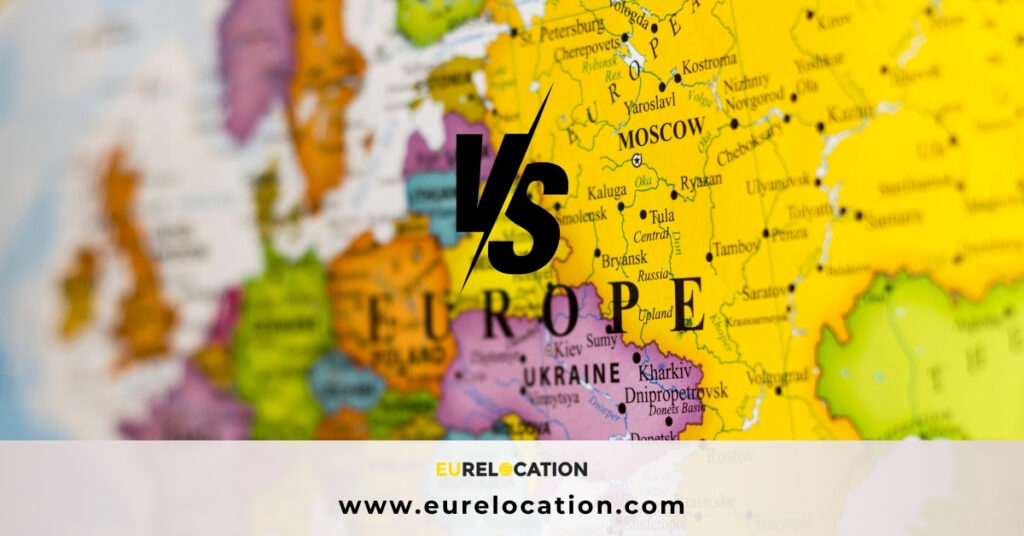When considering a move to Europe, you might find yourself comparing Eastern vs. Western Europe. Each region offers a unique lifestyle, culture, and opportunities. To help you make an informed decision, let’s explore the pros and cons of living in Eastern vs. Western Europe
Europe is incredibly diverse, with each country boasting its own distinct traditions, languages, and ways of life. Eastern Europe, characterized by its historical cities, scenic landscapes, and lower cost of living, is gaining popularity as an attractive destination. Meanwhile, Western Europe, known for its economic powerhouses, high living standards, and rich cultural offerings, continues to draw people from all over the globe.
Here, we will delve into various aspects of living in Eastern vs. Western Europe, including cost of living, job opportunities, quality of life, cultural differences, language barriers, climate, safety and stability, healthcare, and education. By looking at these factors, we aim to give you a clear understanding of which region might best suit your lifestyle and aspirations.
Cost of Living
Eastern Europe: One of the main advantages of living in Eastern Europe is the lower cost of living. Countries like Poland, Hungary, and Romania offer affordable housing, food, and entertainment. This makes it easier for expats and locals alike to enjoy a comfortable lifestyle without breaking the bank.
Western Europe: On the other hand, Western Europe is known for its higher cost of living. Cities like London, Paris, and Zurich are among the most expensive in the world. However, the higher prices are often offset by higher salaries and a strong social welfare system, ensuring a good quality of life.
Job Opportunities
Eastern Europe: Eastern Europe is rapidly developing, and with this growth comes increasing job opportunities, especially in tech and outsourcing industries. Countries like Estonia and the Czech Republic have become tech hubs, attracting skilled professionals from around the world. However, wages are generally lower compared to Western Europe.
Western Europe: Western Europe boasts a diverse job market with many opportunities in finance, engineering, and creative industries. Cities like Berlin, Amsterdam, and Munich are known for their vibrant job markets and high salaries. Additionally, Western Europe offers robust workers’ rights and benefits, making it an attractive destination for career-focused individuals.
Eastern vs. Western Europe: Quality of Life
Eastern Europe: Eastern Europe offers a high quality of life, with beautiful landscapes, rich history, and vibrant cultures. The pace of life tends to be slower, allowing residents to enjoy a more relaxed lifestyle. However, infrastructure and public services can sometimes lag behind those found in Western Europe.
Western Europe: Western Europe is renowned for its high quality of life, excellent healthcare, and well-developed infrastructure. Cities are well-connected by public transportation, and there is a strong emphasis on environmental sustainability. The region’s high standard of living is a major draw for many expats.
Cultural Differences
Eastern Europe: Eastern Europe is rich in history and cultural diversity. The region has a blend of Slavic, Baltic, and other influences, offering a unique cultural experience. Festivals, traditional music, and historical landmarks are abundant, providing a deep sense of heritage.
Western Europe: Western Europe is equally diverse but with a different cultural flavor. It is home to some of the world’s most famous museums, art galleries, and historical sites. The cultural scene is vibrant, with numerous events, festivals, and performances happening year-round. Western Europe also has a strong focus on multiculturalism and inclusivity.
Language Barrier
Eastern Europe: In Eastern Europe, the dominant languages vary by country, with Russian, Polish, Hungarian, and others being widely spoken. English proficiency can be lower compared to Western Europe, which might pose a challenge for newcomers. However, younger generations and professionals often speak English, especially in urban areas.
Western Europe: Western Europe generally has higher levels of English proficiency, particularly in countries like the Netherlands, Germany, and Scandinavia. This makes it easier for expats to navigate daily life and integrate into the community. Additionally, many Western European countries offer language courses to help newcomers learn the local language.
Climate
Eastern Europe: The climate in Eastern Europe can be quite varied. Countries in the north experience cold winters and mild summers, while those in the south enjoy a more Mediterranean climate. The seasonal changes are distinct, offering a variety of weather experiences throughout the year.
Western Europe: Western Europe tends to have a milder climate, with temperate weather year-round. Coastal areas, such as those in Spain and Portugal, enjoy warm summers and mild winters. Inland regions, like those in France and Germany, experience more pronounced seasonal changes but generally avoid extreme temperatures.
Eastern vs. Western Europe: Safety and Stability
Eastern Europe: Safety in Eastern Europe can vary, but many countries have low crime rates and are considered safe for residents and travelers. Political stability is generally good, although some countries may experience occasional unrest. It is important to research the specific country you are interested in to understand its safety dynamics.
Western Europe: Western Europe is known for its high levels of safety and political stability. Countries like Switzerland, Denmark, and Norway consistently rank among the safest in the world. The strong rule of law and well-developed public institutions contribute to a secure living environment.
Healthcare
Eastern Europe: Healthcare in Eastern Europe has improved significantly in recent years, but it can still lag behind Western standards. Public healthcare systems are available, but private healthcare is often preferred by expats due to better facilities and shorter waiting times.
Western Europe: Western Europe boasts some of the best healthcare systems in the world. Countries like France, Germany, and Sweden provide high-quality, universal healthcare. Access to advanced medical treatments and well-trained healthcare professionals is a significant advantage of living in Western Europe.
Education
Eastern Europe: Education in Eastern Europe is generally of good quality, with a strong emphasis on science and mathematics. However, the availability of international schools can be limited, which might be a concern for expats with children. Higher education institutions are improving and attracting more international students.
Western Europe: Western Europe is home to some of the world’s top universities and educational institutions. The education system is well-funded, and there are numerous international schools catering to expat families. This makes Western Europe an attractive option for those prioritizing education.
Eastern vs. Western Europe: Who Wins?
Choosing between Eastern vs. Western Europe depends on your personal preferences, career goals, and lifestyle priorities. Eastern Europe offers affordability, a rich cultural experience, and growing job opportunities. Western Europe, on the other hand, provides a high standard of living, excellent healthcare, and a diverse job market. Both regions have their unique charm and advantages, making either a great place to call home.
Whether you prefer the historical depth of Eastern Europe or the modern amenities of Western Europe, you are sure to find a place that suits your needs and aspirations.









